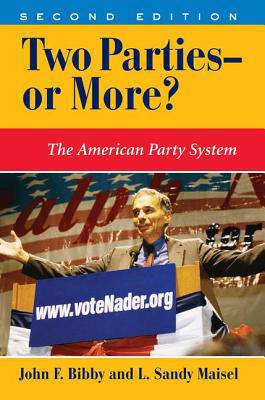
Je cadeautjes zeker op tijd in huis hebben voor de feestdagen? Kom langs in onze winkels en vind het perfecte geschenk!
- Afhalen na 1 uur in een winkel met voorraad
- Gratis thuislevering in België vanaf € 30
- Ruim aanbod met 7 miljoen producten
Je cadeautjes zeker op tijd in huis hebben voor de feestdagen? Kom langs in onze winkels en vind het perfecte geschenk!
- Afhalen na 1 uur in een winkel met voorraad
- Gratis thuislevering in België vanaf € 30
- Ruim aanbod met 7 miljoen producten
Zoeken
€ 83,95
+ 167 punten
Uitvoering
Omschrijving
Students of American government are faced with an enduring dilemma: Why two parties? Why has this system remained largely intact while around the world democracies support multiparty systems? Should our two-party system continue as we enter the new millennium? This newly revised and updated edition of Two Parties-Or More? answers these questions by placing the dilemma in the context of recent elections and the environment in which all parties must function. The text provides students with a historical overview of minor parties and their impact on politics. By focusing on Ross Perot's efforts in 1992 and 1996 and the difficulty the Reform party faced in 2000, Jesse Ventura's gubernatorial victory in Minnesota, and Ralph Nader's Green party campaign for the presidency in 2000, the text lays out the current dilemma regarding third parties and explores the extent and cause of the current dissatisfaction with the two major parties. The authors conclude with predictions about the future of third-party politics in the states and the nation. The text is enhanced with a glossary, discussion questions, and an appendix of important third parties in presidential elections and recent officeholders who were neither Democrats nor Republicans. The revised edition highlights the implications of recent successes (Angus King in Maine in 1994 and 1998, Ventura in Minnesota, Perot in 1992, and Nader in 2000) and failures (the Reform party in 2000 and fewer third party winners in the states) of third party efforts for the future of America's traditionally two-party system.
Specificaties
Betrokkenen
- Auteur(s):
- Uitgeverij:
Inhoud
- Aantal bladzijden:
- 168
- Taal:
- Engels
- Reeks:
Eigenschappen
- Productcode (EAN):
- 9780813340319
- Verschijningsdatum:
- 20/08/2002
- Uitvoering:
- Paperback
- Formaat:
- Trade paperback (VS)
- Afmetingen:
- 153 mm x 231 mm
- Gewicht:
- 235 g

Alleen bij Standaard Boekhandel
+ 167 punten op je klantenkaart van Standaard Boekhandel
Beoordelingen
We publiceren alleen reviews die voldoen aan de voorwaarden voor reviews. Bekijk onze voorwaarden voor reviews.









